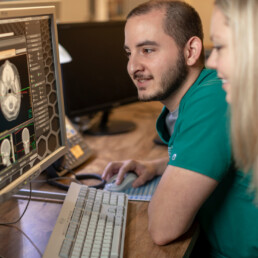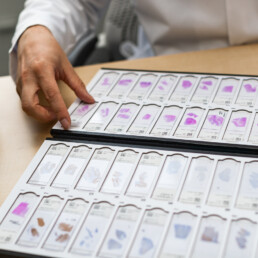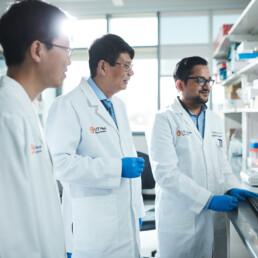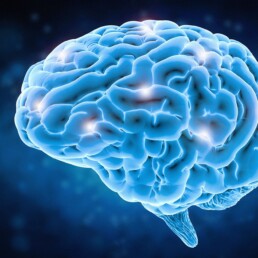Basic Science and Bench Research
We discover a deep understanding of brain function, from genes to behavior.

How we are advancing basic science and bench research





Science and Research Statistics
Face the Facts
There are more than 550 clinical trials at the university that are enrolling study participants.
Through its groundbreaking research, UT Health Science Center San Antonio has developed 22 FDA-approved cancer treatments that are used today.
UT Health San Antonio's Greehey Children's Cancer Research Institute is the site of more than 12 research laboratories focusing on cancer genomics, DNA repair, RNA biology and drug development for new and less-toxic treatments for childhood cancers.
Mysteries of the Mind
Mysteries of the mind are investigated through clinical and translational research to decipher the structure and function of living organisms. While a myriad of projects are executed at UT Health San Antonio, neuroscience research is given the highest priority.

Research Imaging Institute
UT Health San Antonio’s Research Imaging Institute focuses on solving these mysteries.
A research resource that promotes collaborative projects that cross departmental and institutional boundaries, the Research Imaging Institute mission is to develop non-invasive biomedical imaging and measurement methods for use in basic, clinical and translational research to decipher the structure and function of living organisms with neuroscience research having highest priority.
The Research Imaging Center has amassed one of the world’s largest arrays of imaging equipment for research with animals and is one of the few in the U.S. that enables researchers to study multiple species of animals with multiple types of systems, including functional and anatomical MRI, and positron-emission tomography (PET).
Peter Fox M.D. serves as the Director for the Research Imaging Institute.
Director for the Research Imaging Institute
Drug Discovery Initiatives
There are a wide array of opportunities to improve human health with our team’s notable expertise in neuroscience, substance use disorders, drug-receptor interactions, aging, diabetes, and cancer. The UT Health San Antonio Department of Pharmacology is making strides in improving human health through drug discovery initiatives daily.

Department of Pharmacology
The Department of Pharmacology within the Joe R. and Teresa Lozano Long School of Medicine conducts basic and translational research across a wide spectrum of diseases to improve human health. Consistently ranked among the top 25 Departments of Pharmacology in National Institutes of Health (NIH) funding, the department utilize cutting-edge techniques encompassing cellular and molecular biology, optogenetics, and behavioral assays to test hypotheses. Because of the departmental diversity in disease models as well as technical approaches, faculty routinely collaborate on integrated research projects. Drug discovery initiatives in the department often involve collaborations with chemistry partners to optimize initial leads for eventual drug development.
The department hosts the Center for Biomedical Neuroscience (CBN), the Addiction Research, Treatment & Training Center of Excellence (ARTT), their respective NIH T32 training grants, and an ASPET® undergraduate research program.
Related Articles
Stress-Related Psychiatric Disorders
Stress and stress-related psychiatric disorders can have negative impacts on the mind and severely inhibit daily life. Our team at the Center for Biomedical Neuroscience within the Joe R. and Teresa Lozano Long School of Medicine is working to discover better treatments for these disorders.

Center for Biomedical Neuroscience
The research through the Center for Biomedical Neuroscience addresses:
- Regulation and integration of the acute behavioral, cognitive and endocrine responses to stress;
- Adaptive and maladaptive responses to chronic stress;
- Regulatory mechanisms of action of psychotherapeutic drugs and other types of therapeutic interventions, including behavioral therapies;
- Cognitive impairment after cancer therapy and its treatment.
The area of study includes the modulation of behavioral and neuroendocrine responses to acute stress, and strategies to enhance higher-order cognitive processes mediated in the prefrontal cortex related to cognitive flexibility and coping behavior. Our work is relevant to understanding stress-related pathology underlying illnesses such as depression, PTSD, anxiety disorders, age-related cognitive impairment, cancer chemo brain.
David A. Morilak, Ph.D. serves as the Director for the Center for Biomedical Neuroscience of the nervous system.
Director for the Center for Biomedical Neuroscience
The University of Texas Health Science Center at San Antonio (UT Health San Antonio), a primary driver for San Antonio's $44.1 billion health care and biosciences sector, is the largest academic research instituion in South Texas with an annual research portfolio of more than $360 million. Driving substantial economic impact with its six professional schools, a diverse workforce of 7,900, an annual operating budget of $1.08 billion and clinical practices that provide 2.6 million patient visits each year, UT Health San Antonio plans to add more than 1,500 higher-wage jobs over the next five years to serve San Antonio, Bexar County and South Texas.

